- Home
- Bertolt Brecht
Collected Plays, Volume 4 (Bertolt Brecht: Plays, Poetry & Prose) 8 Page 2
Collected Plays, Volume 4 (Bertolt Brecht: Plays, Poetry & Prose) 8 Read online
Page 2
Search in your own hearts and minds for similar deeds
In the recent past or for the absence
Of any such deeds.
So it may be quite appropriate that, in the 1960s, critics of this deliberately and transparently adapted play heard and saw hints of contemporary events in Vietnam, Pakistan and India. The epic method is meant to encourage just such an open, re-evaluative approach. Despite its difficulty, Brecht’s Antigone remains an intriguing text and a provocative play, whose day is not done as long as there are wars and the moral and social conflicts they entail.
* * *
In the meantime, there were plans afoot to bring Brecht back to Berlin, led by Herbert Ihering, the critic who had championed him in the 1920s and who had remained in Germany. Brecht himself hoped to be able to return to the Theater am Schiffbauerdamm, where he had worked in the last years of the Weimar Republic. Early in 1948 Wolfgang Langhoff staged a successful production of Fear and Misery of the Third Reich at the Deutsches Theater, and then offered that theatre for Brecht’s and Erich Engel’s own production of Mother Courage. Later in the year there were productions of Puntila in Hamburg and of Mother Courage in Vienna. But Brecht himself was still in Zurich, waiting for his papers to come through. Contemplating the risk of future travel restrictions, he discussed with Neher and von Einem the possibility of working as house playwright at the Salzburg Festival, of which von Einem was a director, and of acquiring Austrian citizenship.
Eventually, Brecht and Weigel made a first visit to Berlin, in October 1948. Thanks to the efforts of Ihering, Langhoff and others, and with the support of the Communist Kulturbund and senior figures in the Central Committee of the Socialist Unity Party (Wilhelm Pieck, soon to be the first President of the GDR, and Otto Grotewohl, the equivalent of Prime Minister), they were given an official welcoming reception. But negotiations and discussions about a company, and about the availability of a suitable theatre, remained mired in nervous uncertainty. Then, quite suddenly, the success of Mother Courage in Berlin in January 1949 lent momentum to the matter. The couple were offered what was in the circumstances an extraordinary opportunity: to set up their own ensemble. They moved quickly. In February 1949 the constitution of the Berliner Ensemble was agreed, and by April its funding was approved. Weigel became its able and strong-willed intendant (and was to give defining performances as Courage and Pelegea Vlassova in The Mother); Brecht was its artistic director and, in the first years, the director, or co-director with Engel, of its most famous productions; Dessau and Eisler were its composers; and Neher was for years its exemplary designer. From now on, the composition of this Ensemble and its repertoire became Brecht’s overriding concerns.
This was the context of The Days of the Commune. Brecht had returned to Zurich alone in late February, in order to recruit actors and other theatre professionals, to collect his daughter, and to settle his affairs there (including setting up a Swiss bank account, just in case). It was presumably the new Ensemble’s commitment to a ‘progressive’ programme that induced him, despite his reservations about the author’s political insight, to look once more at Nordahl Grieg’s play, Defeat (see Editorial Notes). The appraisal of the Paris Commune by Marx and Engels (and subsequently Lenin) had established the Commune as the first ’proletarian revolution’ and the earliest example of a ‘Soviet’-style social organisation by democratic council. It must have seemed ideal material for the new company’s opening production. If it didn’t work out, the other play Brecht was considering was Büchner’s French Revolutionary drama, Danton’s Death. In Zurich Ruth Berlau joined him and, with Caspar Neher, they worked together on the evidently recalcitrant material, resolving soon to depart quite decisively from Grieg’s play. By the end of April 1949 the manuscript of the new play was finished. But it had been a rush-job and it is clear that Brecht still had his misgivings. He resolved to launch the Ensemble with the far less controversial Puntila, and The Days of the Commune was scheduled instead as the third production (after Puntila and Maxim Gorki’s Vassa Sheles-nova). In December he decided to postpone it still further, in favour of a new adaptation of J.M.R. Lenz’s The Tutor- ‘because the Volksbühne with about 60,000 members, which makes up the bulk of our audience, has only about 0.3% workers’ (Journals, p.425). Preliminary preparations for a production continued, but other new projects kept intervening. It was not in fact until 17 November 1956, three months after Brecht’s death, that The Days of the Commune had its premiere, in Karl-Marx-Stadt (Chemnitz), under the joint direction of two of Brecht’s young protégés, Benno Besson and Manfred Wekwerth.
In his interpretation of the Paris Commune Brecht adhered closely to the ‘classical’ line established by Marx and represented in Brecht’s most important historical source-book, Hermann Duncker’s edited collection of documents and other material, Pariser Kommune 1871 (Berlin, 1931): that the outcome of the siege of Paris after the Franco-Prussian War could only have been different if the ruling class had been prepared to align themselves behind the National Guard, but that the French bourgeoisie were terrified at the thought of an armed labour force, and so initiated the betrayal of the French people by its government and the capitulation of Paris. He defended his account in November 1949 in a letter to Eric Russell Bentley, his American translator and an early champion of the Brechtian theatre:
It’s probably true that the play cannot be accepted unless one accepts the Marxist point of view. But to take a classical example: To accept Hamlet or Troilus and Cressida mustn’t one accept the attitudes of Montaigne or Bacon? [ … ] What the play can show is only that the proletariat cannot counter the force of its adversaries unless it is prepared to use force. I’ve made no attempt to bring out parallels between Paris in 1871 and Berlin in 1949, not even where they might have greatly simplified the play. (Letters, p.482)
Some of the possible objections to the play are anticipated, even before it had been published or produced. But the debate is clearly not just about the interpretation of distant historical events. The reference to Berlin in 1949 is to a tense political situation. In response to economic reform in the West and the perceived threat of a strong new currency, the USSR had severed land communications to the Western sectors of the city, leading to the blockade. As Brecht saw it, the new Communist regime was seeking to protect itself against the capitalist West, rather as the Paris Commune had erected the barricades against the bourgeois government and its new Prussian friends. Under the circumstances, it is hardly surprising that the play seemed too party-political for commentators in the West. Correspondingly, for the Communist world it was insufficiently politically resolute: an internal report for the Central Committee condemned Brecht’s new piece as a depressing account of a failed revolution.
The premiere seven years later (with Neher’s stage set and Eisler’s music) met with considerable interest, partly because it was the first production of a Brecht play after his death. But the critics were still uncertain what to make of it. They were divided in their assessments of its historical value and of possible contemporary analogies (now to the uprising in Hungary), they wondered if Brecht had abandoned Verfremdung in favour of Socialist Realism, and Alfred Kurella opined that it was one of Brecht’s weakest works, for it spoke to neither heart nor head. The atmosphere of the Cold War invaded the responses in the West: this was a celebration of terror, an incitement to political murder, and so on. Arthur Adamov riposted with his own Commune-play Le Printemps 71 (1960), an effort to set the record straight in both historical and artistic terms. A second Berliner Ensemble production, in 1962, of a radically revised version by Wekwerth and Tenschert, was evidently conceived to imply an analogy between the Paris barricades and the erection of the Berlin Wall (in August 1961). It was quietly but positively received in the East; in the West the perfection of the staging was admired, while the political implications (that such brutal measures might be necessary) were deplored. Since then The Days of the Commune has been one of the least performed of Brecht’s plays, and
at the same time one of the most contentious. Its reception in the theatre has been, more than of any other play, entangled in the changing political contexts: a first West German production soon after the 1968 unrest, a Frankfurt production at the time of the RAF terrorist attacks, and so on. The Commune has been made to serve as a symbol both of the endangered Communist revolution and of anti-Communist revolt. Directors and critics have repeatedly exploited the claim that the play is supposedly unfinished.
The accusations sometimes levelled at the play, of a crude realism, historical naivety and, worse, of political propagandism and Stalinism, are misplaced. Brecht may insist on violence for the preservation of the good cause, but his determined move back to Marx’s own critique of the Commune implies very much a revolutionary history carried on the back of the working masses, and not a Leninist Party, let alone a Stalinist one. Brecht creates a class of representative individuals, and above all a family (Madame Cabet and her circle), as both objects and potentially powerful subjects of history. And the play employs familiar Brechtian strategies: relatively self-contained ‘gestic’ scenes, moments of Verfremdung and ‘play-within-play’. In one particular way, however, the technique does perhaps represent an interesting variation. Although Grieg’s play is obviously an important point of departure, The Days of the Commune also proceeds - in an exceptionally documentary manner for Brecht (see Editorial Notes) - from the stuff of history (and from that one canonical interpretation, by Marx). So, whereas he is elsewhere inclined to confront the fables and the fictions with social and historical reality (and it is out of that that a critical, verfremdet reception is derived), here the contradictions have to be discovered between the historical facts themselves and the historical truth (in Brecht’s sense of a ‘useful’ insight) - between the real mistakes of the Commune and the interpretations of those mistakes, in their turn historically determined.
In his work on the Antigone-Model Brecht had suggested that the choice of material depended on its capacity both to set interesting formal problems and to achieve a certain contemporary resonance. Writing later about Coriolanus he argued that the discovery of new and ‘relevant’ readings was part of ‘the fun of dealing with a slice of illuminated history’ (Brecht on Theatre, p.265). Klaus Detlef Müller has argued that The Days of the Commune is just such a slice.1 The dialectical negotiations between the historical material and its changing relevance in different historical periods and contexts are a key to a continuing engagement with Brecht’s drama. Rather like the process of transparent adaptation (in Antigone) which invites the continual re-evaluation of a text, so the process here is conceived to reveal what we might call ‘the history of a history’: from Marx (whom Brecht treats as a base), through Lenin, to the divided Germany of 1949. It is a small step to develop this trajectory beyond Brecht’s own lifetime: to the uprisings of 1956, the crisis of 1961/62, the eruptions of the later 1960s, and after. Although the vision of a proletarian state may have faded in our own time, it is still possible to see in Brecht’s play shadows of more recent political phenomena, such as the collapse of the very Communist state for which it was originally conceived, or the corruption of social democracy by global capitalism. Above all, The Days of the Commune is a conscientious exercise in thinking beyond defeat.
* * *
So, in November 1949, the Berliner Ensemble began its career not with a new play, but with the Brecht-Engel production of Puntila, once more with Leonard Steckel (a former Piscator actor from Zurich) as Puntila, and now with music by Dessau and sets by Neher. The early history of the remarkable institution of the Berliner Ensemble - a state company of the GDR under the auspices of the Ministry of Education - belongs elsewhere: its array of old talents from the Left theatre of the Weimar Republic, the exceptional performers and directors of the younger generation who were trained here, the controversies over programmes, the adaptations and excursions into old and new repertoires, its move back into the Schiffbauerdamm Theatre, its struggles at home and its triumphant tours to Paris and London. The outline is given in the Letters volume (pp.431-39), and the political context and Brecht’s response discussed in more detail in Brecht on Art and Politics (pp.273-81).
For Brecht’s own last play we turn away, in the first instance, from the broader history of this literary field, and even from the 1950s. For the first mention of the title Turandot is in a notebook of 1922/23, in a list of literary works and figures that had attracted Brecht’s interest. As far as we know, he only came back to the story in the 1930s. Drafts and sketches from the next twenty years are reviewed briefly in the Editorial Notes.
There are a handful of projects like this, that occupied Brecht’s energies intermittently over a very long period. His first play Baal was revisited in three subsequent decades; the first sketches for what was to become, in the 1940s, The Good Person of Szechwan date from the mid-1920s; and Life of Galileo went through three very different versions over the course of nearly twenty years. In each case, these were concepts which were allowed to evolve, to shed old concerns and to accrue new ones, as the context of writing and reception moved on. In each case, the later versions are supported as though on a layered skein of allusions and points of reference. The concerns of the older drafts are still visible through the later texts. Rather as Antigone and The Days of the Commune, by their very structure, encourage re-evaluations, here the texts themselves are changeable, for a changeable world. Contradictions are allowed, even encouraged, to survive the process. So Turandot or The White-washers’ Congress manages to be ‘about’ the role of the intellectual in the Weimar Republic, and in Nazi Germany, and in the GDR. It is vain to search for a single integrated reading which can easily embrace all its terms of reference. All sorts of allusions, again to over twenty years of contemporary history, are allowed to rub up, one against the other.
In Turandot, all this is made easier by the extremely free treatment of the traditional Turandot story, and by the use of an obviously verfremdet, almost fairy-tale setting. Brecht’s China only very occasionally stands in for the real contemporary China (where Kai Ho takes his bow as Mao Tse-tung). More often it is the poetic fiction of ‘Chima’, as Brecht sometimes called it: a simplified model of social, economic and political structures, part feudal, part monopoly-capitalist, into which he attempts to interleave a bit of Chinese and a lot of European history. In the 1930s Brecht specifically noted that the costumes for this play should be half European and half Chinese.
The genesis (or perhaps better: evolution) of the play is further complicated by its relation to a far larger project, the so-called Tui-Novel. In the mid-1930s Brecht began gathering material for what Walter Benjamin described as ‘an encyclopaedic overview of the idiocies of the Tellectual-Ins (the intellectuals)’. In the first place, the object was a satirical account of the role of the intellectuals in Imperial Germany and the Weimar Republic - who had pretended that their spirit might shape society, when in fact they were in the pay of the ruling class. This was the ‘Golden Age of the Tuis’, before their banishment by the Nazis. The Tuis’ teahouse in Turandot is distinctly reminiscent of the Viennese coffee-houses in Brecht’s ‘Unpolitical Letters’ of 1933 (Brecht on Art and Politics, pp.126-9). The archive contains a vast chaos of further material, sketches, plans and fragmentary drafts. But the ambitious project failed to cohere. Brecht started to discover Tuis almost wherever he looked. The whole notion of the Tuis as a class began to slip out of focus. The conflict between Stalin and Trotsky and the subsequent trials suggested, for example, that the Tuis were still very much a force in the Soviet Union. His experience of America, on the other hand, seemed to imply that the whole thrust of his satire had been misplaced - in this variety of capitalism, prostituting the intellect had become entirely socially acceptable. Gradually the plan metamorphosed: the Tuis became the excuse-mongers, the intellectual lackeys and henchmen of the powers-that-be in every ideological camp. Intellectual enquiry itself, which in the early modern age, had been a productive force, liberating
the emergent bourgeoisie (as portrayed in Galileo and represented in the Baconian Tui-motto ‘knowledge is power’), had not only become unproductive, it had actually fallen into the service of the repression of further social development. Still, the novel remained a series of fragments, and the plan for a play was not, for the time being, pursued.
By the 1950s, Brecht’s perspective on all of this had changed quite radically. Whereas in the past he had always conceived of himself as in opposition, now the status of the Berliner Ensemble, and of Brecht as one of the new state’s pre-eminent cultural figures, meant that he was himself a member of the establishment, communicating with ministers, contributing to the development of policy, and making public statements. He was, moreover, genuinely committed to the future of the GDR, and particularly to its younger generation. Especially in the early years, he wrote a number of Laureate-like poems, and took an active part in the work of the new Academy of Arts, of which he was a founding member. So the problem had become a much more urgent and personal one: how should the creative intellectual, how should the artist conduct himself in the service of a state of which he broadly approved? There may be hints even in the 1930s that Brecht recognised himself, ironically, as a Tui; but in the GDR he was unquestionably implicated with the organs of political power. The difficulty of this quite new situation should not be underestimated. For, although he was clearly no distantly critical dissident, the differences between Brecht and his political masters were considerable too. Despite his general loyalty to the Socialist Unity Party (the SED), the defensive nationalism of the new state contradicted Brecht’s fundamentally open, internationalist attitudes. Moreover, there were serious arguments about aesthetics and the cultural heritage. These surfaced intermittently throughout the period, but perhaps most damagingly over Brecht’s and Dessau’s opera version of Lucullus, which was compulsorily withdrawn in March 1951 on account both of its modern idiom and of its pacifism (cf. Collected Plays: 4). The reprise of the old formalism debates of the 1930s was a particularly depressing experience for Brecht. Differences flared up again in 1953, over a production of the Urfaust and over Eisler’s intended Faust opera, both of which the authorities considered an affront to the cultural heritage (cf. Turandot, scene 9, and see Brecht on Art and Politics, pp.309-30).

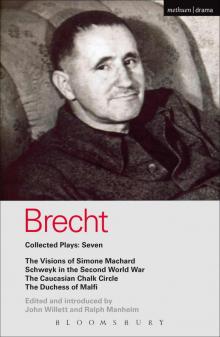 Bertolt Brecht: Mutter Courage und ihre Kinder 7
Bertolt Brecht: Mutter Courage und ihre Kinder 7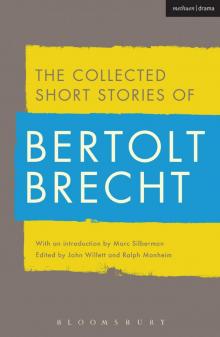 Bertolt Brecht
Bertolt Brecht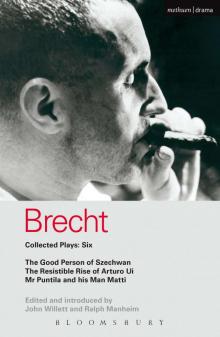 Bertolt Brecht: Mutter Courage und ihre Kinder 6
Bertolt Brecht: Mutter Courage und ihre Kinder 6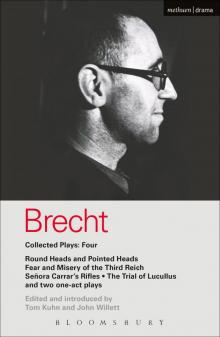 Bertolt Brecht: Mutter Courage und ihre Kinder 4
Bertolt Brecht: Mutter Courage und ihre Kinder 4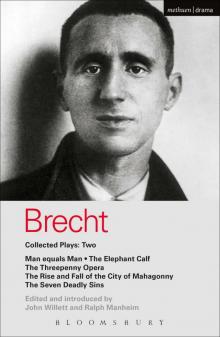 Bertolt Brecht: Mutter Courage und ihre Kinder 2
Bertolt Brecht: Mutter Courage und ihre Kinder 2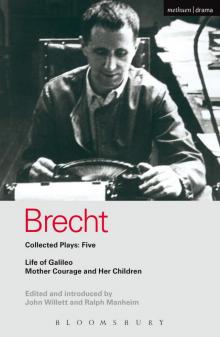 Bertolt Brecht: Mutter Courage und ihre Kinder 5
Bertolt Brecht: Mutter Courage und ihre Kinder 5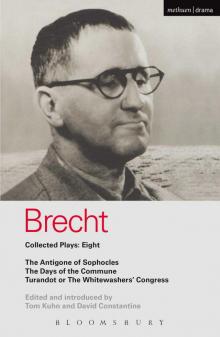 Collected Plays, Volume 4 (Bertolt Brecht: Plays, Poetry & Prose) 8
Collected Plays, Volume 4 (Bertolt Brecht: Plays, Poetry & Prose) 8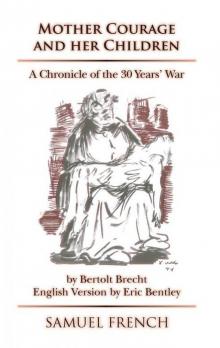 Mother Courage and Her Children
Mother Courage and Her Children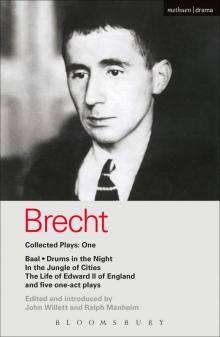 Bertolt Brecht: Mutter Courage und ihre Kinder 1
Bertolt Brecht: Mutter Courage und ihre Kinder 1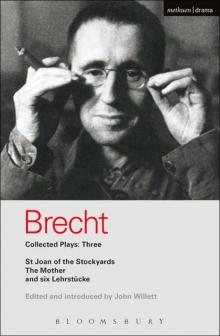 Brecht Collected Plays: 3: Lindbergh's Flight; The Baden-Baden Lesson on Consent; He Said Yes/He Said No; The Decision; The Mother; The Exception & the ... St Joan of the Stockyards (World Classics)
Brecht Collected Plays: 3: Lindbergh's Flight; The Baden-Baden Lesson on Consent; He Said Yes/He Said No; The Decision; The Mother; The Exception & the ... St Joan of the Stockyards (World Classics)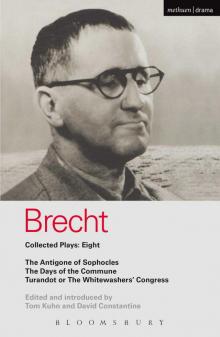 Brecht Plays 8: The Antigone of Sophocles; The Days of the Commune; Turandot or the Whitewasher's Congress: The Antigone of Sophocles , The Days of the Comm (World Classics)
Brecht Plays 8: The Antigone of Sophocles; The Days of the Commune; Turandot or the Whitewasher's Congress: The Antigone of Sophocles , The Days of the Comm (World Classics)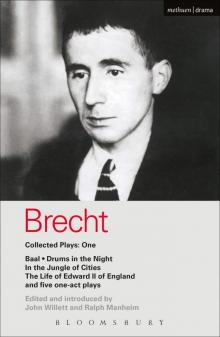 Brecht Collected Plays: 1: Baal; Drums in the Night; In the Jungle of Cities; Life of Edward II of England; & 5 One Act Plays: Baal , Drums in the Night , In the Jungle of Ci (World Classics)
Brecht Collected Plays: 1: Baal; Drums in the Night; In the Jungle of Cities; Life of Edward II of England; & 5 One Act Plays: Baal , Drums in the Night , In the Jungle of Ci (World Classics)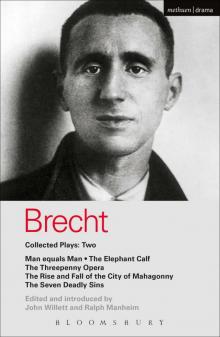 Brecht Collected Plays: 2: Man Equals Man; Elephant Calf; Threepenny Opera; Mahagonny; Seven Deadly Sins: Man Equals Man , Elephant Calf , Threepenny Ope (World Classics)
Brecht Collected Plays: 2: Man Equals Man; Elephant Calf; Threepenny Opera; Mahagonny; Seven Deadly Sins: Man Equals Man , Elephant Calf , Threepenny Ope (World Classics)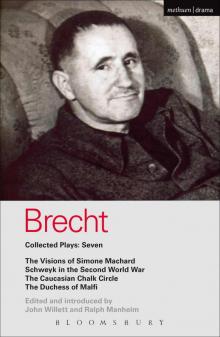 Brecht Collected Plays: 7: Visions of Simone Machard; Schweyk in the Second World War; Caucasian Chalk Circle; Duchess of Malfi (World Classics)
Brecht Collected Plays: 7: Visions of Simone Machard; Schweyk in the Second World War; Caucasian Chalk Circle; Duchess of Malfi (World Classics)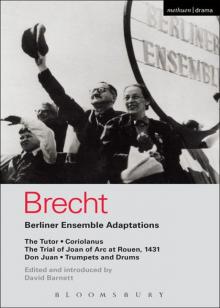 Berliner Ensemble Adaptations
Berliner Ensemble Adaptations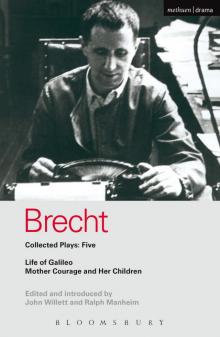 Brecht Collected Plays: 5: Life of Galileo; Mother Courage and Her Children (World Classics)
Brecht Collected Plays: 5: Life of Galileo; Mother Courage and Her Children (World Classics)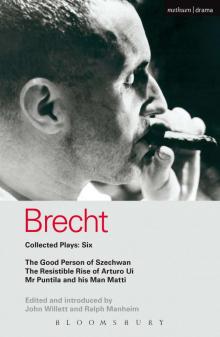 Brecht Collected Plays: 6: Good Person of Szechwan; The Resistible Rise of Arturo Ui; Mr Puntila and his Man Matti (World Classics)
Brecht Collected Plays: 6: Good Person of Szechwan; The Resistible Rise of Arturo Ui; Mr Puntila and his Man Matti (World Classics)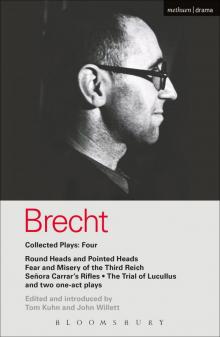 Brecht Collected Plays: 4: Round Heads & Pointed Heads; Fear & Misery of the Third Reich; Senora Carrar's Rifles; Trial of Lucullus; Dansen; How Much Is ... and Misery , Carr (World Classics)
Brecht Collected Plays: 4: Round Heads & Pointed Heads; Fear & Misery of the Third Reich; Senora Carrar's Rifles; Trial of Lucullus; Dansen; How Much Is ... and Misery , Carr (World Classics)